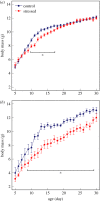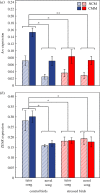Influence of early-life nutritional stress on songbird memory formation
- PMID: 30257911
- PMCID: PMC6170808
- DOI: 10.1098/rspb.2018.1270
Influence of early-life nutritional stress on songbird memory formation
Abstract
In birds, vocal learning enables the production of sexually selected complex songs, dialects and song copy matching. But stressful conditions during development have been shown to affect song production and complexity, mediated by changes in neural development. However, to date, no studies have tested whether early-life stress affects the neural processes underlying vocal learning, in contrast to song production. Here, we hypothesized that developmental stress alters auditory memory formation and neural processing of song stimuli. We experimentally stressed male nestling zebra finches and, in two separate experiments, tested their neural responses to song playbacks as adults, using either immediate early gene (IEG) expression or electrophysiological response. Once adult, nutritionally stressed males exhibited a reduced response to tutor song playback, as demonstrated by reduced expressions of two IEGs (Arc and ZENK) and reduced neuronal response, in both the caudomedial nidopallium (NCM) and mesopallium (CMM). Furthermore, nutritionally stressed males also showed impaired neuronal memory for novel songs heard in adulthood. These findings demonstrate, for the first time, that developmental conditions affect auditory memories that subserve vocal learning. Although the fitness consequences of such memory impairments remain to be determined, this study highlights the lasting impact early-life experiences can have on cognitive abilities.
Keywords: IEG; auditory; developmental stress; electrophysiology; vocal learning; zebra finch.
© 2018 The Author(s).
Conflict of interest statement
We have no competing interests.
Figures



References
-
- Shettleworth SJ. 2010. Cognition, evolution, and behavior. New York, NY: Oxford University Press.
-
- Catchpole CK, Slater PJ. 2008. Bird song: biological themes and variations. Cambridge, UK: Cambridge University Press.
-
- Marler P, Slabbekoorn H. 2004. Nature's music: the science of birdsong. San Diego, CA: Elsevier Academic Press.
Publication types
MeSH terms
Associated data
LinkOut - more resources
Full Text Sources
Other Literature Sources
Medical

